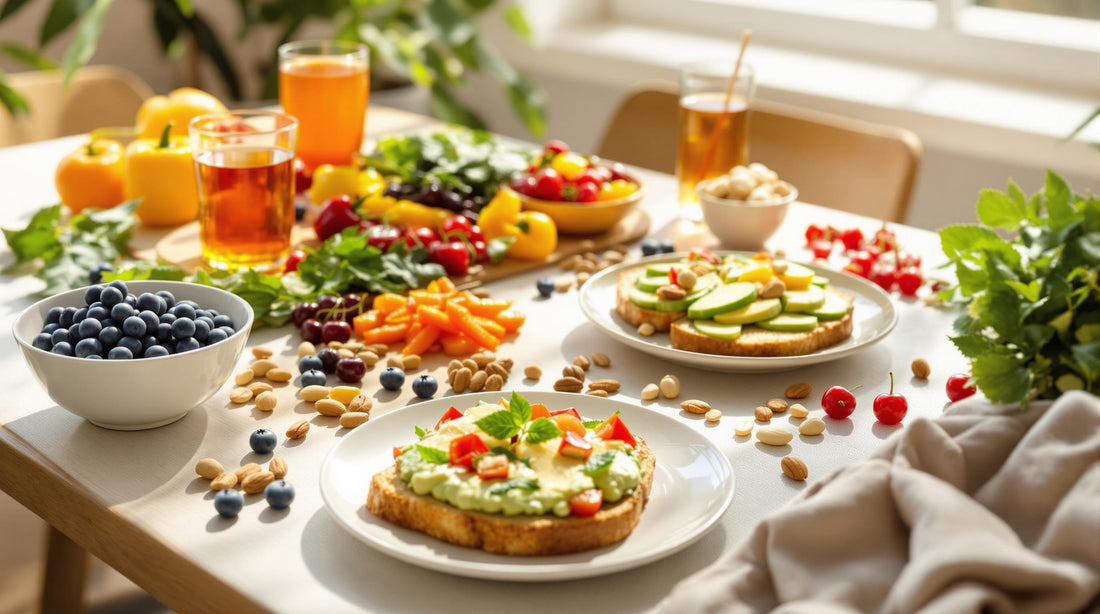Want to reduce snoring and sleep better? Start with your diet. What you eat and drink can directly impact snoring by affecting inflammation, mucus production, and throat muscle relaxation. Here’s what to know:
- Foods to Eat: Anti-inflammatory options like salmon, blueberries, and green tea; natural decongestants like pineapple and ginger; hydrating foods like cucumber and watermelon.
- Foods to Avoid: Dairy, high-fat meals, sugar, alcohol, and spicy or acidic foods - all of which can worsen snoring.
- Meal Timing: Eat your last meal at least 3 hours before bed and stay hydrated throughout the day.
Pair these changes with habits like nasal breathing and proper hydration for noticeable improvements in sleep quality and reduced snoring.
Best Foods to Reduce Snoring
Foods That Help Reduce Inflammation
Adding foods with anti-inflammatory properties to your meals can ease swelling in your throat and nasal tissues, which often contributes to snoring. These foods help keep airways clear and support smoother breathing while you sleep.
Omega-3 Packed Options
- Wild-caught salmon
- Mackerel
- Sardines
- Chia seeds
- Walnuts
These are rich in essential fatty acids, which can help reduce inflammation in your airways.
Antioxidant-Packed Choices
- Blueberries and strawberries
- Dark leafy greens
- Sweet potatoes
- Bell peppers
- Green tea
Antioxidants work to combat inflammation and protect your airways from oxidative stress, promoting better respiratory health.
While reducing inflammation is important, some foods can actively help open up your airways for easier nasal breathing.
Foods That Support Clearer Airways
Certain foods can naturally ease congestion and improve airflow, making it easier to breathe and reducing snoring during sleep.
Natural Decongestants
- Pineapple (contains bromelain)
- Ginger root
- Garlic
- Onions
- Horseradish
These foods contain compounds that thin mucus and relieve congestion, helping you breathe more easily through your nose at night.
Hydrating Foods
- Cucumber
- Watermelon
- Celery
- Oranges
- Honeydew melon
Staying hydrated is key to reducing irritation in your airways. Foods with high water content help keep tissues moist, which minimizes snoring triggers.
Herbal Teas
- Peppermint
- Chamomile
- Thyme
- Eucalyptus
- Nettle
Drinking these teas before bed can help relax and clear your airways. Their natural properties support better respiratory function, making it easier to breathe while you sleep.
7 Foods That You Must Eat To Stop Snoring
Foods That Make Snoring Worse
Certain foods can make snoring worse. Avoiding these can help improve your sleep quality.
Dairy and High-Fat Foods
Dairy products and high-fat foods can increase mucus production and inflammation, which may interfere with nasal breathing and lead to snoring.
Dairy Products to Watch Out For
- Whole milk
- Heavy cream
- Full-fat yogurt
- Aged cheeses
- Ice cream
High-Fat Foods to Limit
- Fried foods
- Processed meats
- Butter and margarine
- Fatty cuts of red meat
- Deep-fried snacks
Try avoiding these foods 3–4 hours before bedtime. Skipping them can help keep your nasal passages clearer.
Sugar and Alcohol
Sugar and alcohol can also affect your breathing during sleep. Sugar promotes inflammation, while alcohol overly relaxes throat muscles, both of which can worsen snoring.
How Sugar Affects You
- Causes inflammation
- Boosts mucus production
- Can lead to weight gain
- Disrupts sleep patterns
Alcohol’s Impact
- Over-relaxes throat muscles
- Disrupts natural breathing rhythm
- Dehydrates the mouth and throat
- Reduces sleep quality
Avoid sugary drinks and alcohol in the evening. If you drink alcohol, try to stop at least 4 hours before bed and drink water to stay hydrated.
Spicy and Acidic Foods
Spicy and acidic foods can trigger acid reflux and irritate your throat, making it harder to breathe through your nose.
Foods to Avoid in the Evening
- Hot peppers and hot sauce
- Tomato-based products
- Citrus fruits and juices
- Vinegar-based dressings
- Raw garlic and onions
Avoid these foods 4–5 hours before bed to reduce reflux and minimize snoring.
Keeping a food diary can help you identify specific triggers that worsen your breathing. Adjusting your diet and meal timing can make a big difference in improving your sleep.
sbb-itb-31084ec
Meal Timing and Habits
Late Night Meals
Eating too close to bedtime can lead to mouth breathing due to a full stomach, which often triggers snoring. This not only disrupts sleep but can also increase the intensity of snoring.
Tips for Dinner Timing
- Finish your last meal at least 3 hours before bed.
- Skip midnight snacks to avoid acid reflux.
If you need a late-night snack, go for something light, like:
- A small apple
- A handful of unsalted almonds
- A few whole-grain crackers
Staying hydrated also plays a role in keeping airways clear.
Water Intake
Proper hydration is key to reducing snoring. Drinking enough water throughout the day helps thin mucus and keeps airways open.
Hydration Tips
- Aim for 8-10 glasses (64-80 oz) of water daily.
- Cut back on fluids 2 hours before bed to minimize bathroom trips.
- Keep a small glass of water by your bed for occasional sips.
- Signs of good hydration: light yellow to clear urine, a comfortable mouth and throat, and clear nasal passages.
Basic Diet Guidelines
Keeping consistent meal times can support better breathing during sleep.
| Meal Type | Timing | Portion Size |
|---|---|---|
| Breakfast | 7-9 AM | Largest meal |
| Lunch | 12-2 PM | Medium portion |
| Dinner | 5-7 PM | Smallest meal |
| Snacks | Before 8 PM | Very light |
Diet Practices to Follow
- Make breakfast your biggest meal of the day.
- Keep dinner light and easy to digest.
- Space meals 4-5 hours apart.
- Incorporate anti-inflammatory foods.
- Stick to a regular eating schedule.
Pairing smart meal timing with thoughtful food choices can help improve both breathing and sleep quality.
Extra Steps for Better Sleep
Once you've adjusted your diet to reduce snoring, there are additional steps you can take to support nasal breathing and improve how well you sleep.
Pair your dietary changes with techniques like mouth taping to encourage nasal breathing and further reduce snoring.
How lulltape Can Help

Mouth taping encourages nasal breathing, which helps keep airways moist, increases oxygen intake by 20%, supports your nervous system, limits bacterial growth, and even influences facial structure.
"The improvement in my sleep quality was almost immediate. Love lulltape!"
Adding this simple habit to your nightly routine can make a noticeable difference. When selecting a mouth tape, choose one specifically made for sleep. lulltape is designed with an H-shape that allows for natural mouth movement while ensuring comfort all night. Made from hypoallergenic, medical-grade materials, it’s gentle on the skin and minimizes irritation.
Many users report immediate improvements in how they sleep and describe lulltape as a game-changer for their nightly routine. Simply apply one strip before bed to enjoy the benefits of consistent nasal breathing while you sleep.
Summary
Making smart food choices can help reduce snoring and improve sleep quality. Prioritizing anti-inflammatory foods while steering clear of dairy, high-fat meals, and alcohol before bed sets the stage for better rest.
Nasal breathing plays a big role here, as it can increase oxygen intake by up to 20%. Pairing dietary adjustments with nasal breathing can amplify the benefits. Using products like lulltape can further encourage nasal breathing and enhance these effects.
"Mouth breathing during sleep is a root cause of poor sleep quality, sagging jawline, bad morning breath, chronic fatigue, and disruptive snoring" - lulltape.com
Here are some tips to get the most out of these changes:
- Have an early, light dinner
- Stay hydrated throughout the day
- Focus on anti-inflammatory foods
- Skip problematic foods before bedtime



